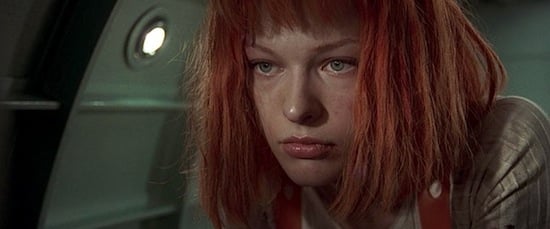Shocking Blocking (31)
By:
August 4, 2012

Luc Besson’s The Fifth Element begins with an alien spacecraft landing in Egypt in 1914 — a scene that is right up my Radium Age science fiction alley. Even better, it begins with a semionautic scene: an archaeologist deciphers hieroglyphics in a quasi-apophenic manner, insisting to a skeptical interlocutor that a Great Evil is due to appear in the mid-23rd century, and that the temple they’ve discovered contains an ancient weapon (consisting of four “elements” plus a fifth, superhuman catalyst) which is humankind’s only defense against this threat. But the scene that really floats my boat is near the end, when the resurrected superheroine Leeloo (Milla Jovovich) is shattered by her rapid study of the history of war on Earth. Like Besson’s other great female protagonist, Nikita of La Femme Nikita, Leeloo’s strength — her ability to draw expertly and productively upon experiential, phenomenological knowledge — is also her weakness. Confronted by horrifying phenomena, she cannot rationalize it away; instead, she trembles violently, tears stream down her face, and she collapses. Unlike Golden Age superhumans, i.e., muscular liberals dedicated to preserving the status quo, Leeloo is a throwback to Radium Age superhumans. She is illiberal, incapable of compromise — and this makes her a feral figure.
An occasional series analyzing some of the author’s favorite moments in the positioning or movement of actors in a movie.
THIRTIES (1934–1943): It Happened One Night (1934) | The Man Who Knew Too Much (1934) | The Guv’nor (1935) | The 39 Steps (1935) | Young and Innocent (1937) | The Lady Vanishes (1938) | Mr. Smith Goes to Washington (1939) | The Big Sleep (1939) | The Little Princess (1939) | Gone With the Wind (1939) | His Girl Friday (1940)
FORTIES (1944–1953): The Diary of a Chambermaid (1946) | The Asphalt Jungle (1950) | The African Queen (1951)
FIFTIES (1954–1963): A Bucket of Blood (1959) | Beach Party (1963)
SIXTIES (1964–1973): For Those Who Think Young (1964) | Thunderball (1965) | Clambake (1967) | Bonnie and Clyde (1967) | Madigan (1968) | Wild in the Streets (1968) | Barbarella (1968) | Harold and Maude (1971) | The Mack (1973) | The Long Goodbye (1973)
SEVENTIES (1974–1983): Les Valseuses (1974) | Eraserhead (1976) | The Bad News Bears (1976) | Breaking Away (1979) | Rock’n’Roll High School (1979) | Escape from Alcatraz (1979) | Apocalypse Now (1979) | Caddyshack (1980) | Stripes (1981) | Blade Runner (1982) | Tender Mercies (1983) | Monty Python’s The Meaning of Life (1983)
EIGHTIES (1984–1993): Repo Man (1984) | Buckaroo Banzai (1984) | Raising Arizona (1987) | RoboCop (1987) | Goodfellas (1990) | Candyman (1992) | Dazed and Confused (1993) |
NINETIES (1994–2003): Pulp Fiction (1994) | The Fifth Element (1997)
OUGHTS (2004–13): Nacho Libre (2006) | District 9 (2009)
Joshua Glenn’s books include UNBORED: THE ESSENTIAL FIELD GUIDE TO SERIOUS FUN (with Elizabeth Foy Larsen); and SIGNIFICANT OBJECTS: 100 EXTRAORDINARY STORIES ABOUT ORDINARY THINGS (with Rob Walker).
